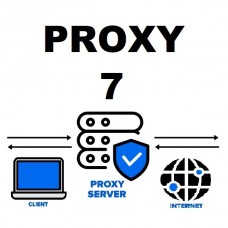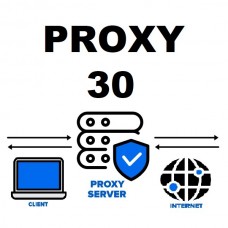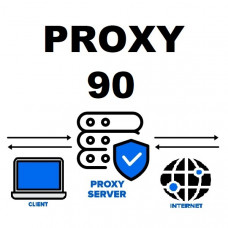Buy Proxy: Your Ultimate Guide to Purchasing Proxies Online
Welcome to the ultimate guide on how to buy proxy services online. Whether you're a seasoned professional or just dipping your toes into the world of proxies, this comprehensive guide will walk you through everything you need to know. From understanding what proxies are to choosing the right type for your needs, we've got you covered.
- What is a Proxy?
- Benefits of Using a Proxy
- Types of Proxies
- Considerations for Buying a Proxy
- Where to Buy a Proxy
- How to Choose the Right Proxy
- Setting Up Your Proxy
- Proxy Maintenance
- Proxy Security
- Conclusion
What is a Proxy?
Let's start with the basics. A proxy acts as an intermediary between your device and the internet. When you use a proxy server, your internet traffic is routed through the proxy server before reaching its destination.
This means that your IP address is masked, providing you with anonymity online. Additionally, proxies can be used to bypass geo-restrictions and access content that may be blocked in your region.
Now that we have a basic understanding of what a proxy is, let's dive into the benefits of using one.
Benefits of Using a Proxy
There are several benefits to using a proxy, including:
- Enhanced Privacy: By masking your IP address, proxies help protect your online privacy.
- Access Blocked Content: Proxies allow you to bypass geo-restrictions and access content that may be blocked in your region.
- Improved Security: Proxies can add an extra layer of security by hiding your IP address from potential hackers.
- Increased Anonymity: With a proxy, your online activities are more difficult to trace back to you.
- Web Scraping: Proxies are essential for web scraping, allowing businesses to gather data from websites for market research, competitor analysis, and more.
Now that you understand the benefits, let's explore the different types of proxies available.
Types of Proxies
There are several types of proxies, each with its own unique features and use cases. Some of the most common types include:
| Proxy Type | Description |
|---|---|
| HTTP Proxies | Used for web browsing and accessing HTTP websites. |
| HTTPS Proxies | Similar to HTTP proxies but provide encrypted communication. |
| SOCKS Proxies | Supports various types of internet traffic, including TCP and UDP. |
| Residential Proxies | IP addresses assigned by Internet Service Providers (ISPs) to homeowners. |
| Datacenter Proxies | Proxies hosted on servers in data centers. |
Each type of proxy has its own advantages and disadvantages, so it's essential to choose the right one for your specific needs.
Considerations for Buying a Proxy
When purchasing a proxy, there are several factors to consider:
- Reliability: Ensure the proxy service provider offers reliable connections with minimal downtime.
- Speed: Look for proxies that offer fast connection speeds to ensure smooth browsing experiences.
- Location: Consider the geographical location of the proxy servers, especially if you require access to region-specific content.
- Security: Choose proxies that prioritize security features such as encryption and authentication.
Now that you know what to look for, let's explore where you can buy proxies.
Where to Buy a Proxy
There are numerous online platforms where you can purchase proxies, including:
- Proxy Service Providers: Companies that specialize in providing proxy services.
- Marketplaces: Online marketplaces where individuals and businesses buy and sell proxies.
- Reseller Websites: Websites that purchase proxies in bulk and resell them to customers.
Each option has its pros and cons, so be sure to research and choose a reputable provider.
How to Choose the Right Proxy
Choosing the right proxy involves considering your specific needs and preferences. Here are some tips to help you make the right decision:
- Identify Your Use Case: Determine what you'll be using the proxy for (e.g., web scraping, social media management, etc.).
- Evaluate Features: Compare the features offered by different proxy providers, such as IP rotation, location targeting, and protocol support.
- Read Reviews: Look for reviews and testimonials from other users to gauge the reliability and performance of the proxy service.
By taking these factors into account, you can select a proxy that meets your requirements.
Setting Up Your Proxy
Once you've purchased a proxy, setting it up is relatively straightforward. Most proxy providers offer detailed instructions on how to configure your device or software to use the proxy.
Typically, you'll need to enter the proxy server's IP address and port number into your device or software settings. Some proxies may also require authentication credentials for added security.
After configuring your device or software, you should be able to start using the proxy immediately.
Proxy Maintenance
Like any other technology, proxies require regular maintenance to ensure optimal performance. Here are some maintenance tips to keep in mind:
- Monitor Performance: Keep an eye on your proxy's performance metrics, such as connection speed and uptime.
- Update Software: Ensure your proxy software is up to date with the latest security patches and features.
- Rotate IP Addresses: If your proxy provider offers IP rotation, consider rotating your IP addresses regularly to avoid detection.
By staying proactive with maintenance, you can prolong the lifespan of your proxy and maximize its effectiveness.
Proxy Security
Security is a critical consideration when using proxies, especially if you're handling sensitive information or performing tasks that require anonymity. Here are some security best practices to follow:
- Use Encryption: Whenever possible, choose proxies that support encrypted communication protocols such as HTTPS.
- Enable Authentication: Protect your proxy from unauthorized access by enabling authentication mechanisms such as username and password authentication.
- Monitor Traffic: Keep an eye on your proxy traffic for any suspicious activity that may indicate a security breach.
By following these security best practices, you can minimize the risk of security threats and ensure a safe browsing experience.
Conclusion
Buying a proxy can provide numerous benefits, including enhanced privacy, access to blocked content, and improved security. By understanding the different types of proxies available and considering factors such as reliability, speed, and security, you can choose the right proxy for your needs. Whether you're a casual user or a business looking to streamline your online activities, purchasing a proxy can help you achieve your goals while maintaining anonymity and security.
Frequently Asked Questions
- What is a proxy?
A proxy acts as an intermediary between your device and the internet, allowing you to browse the web anonymously and access blocked content.
- What are the benefits of using a proxy?
Proxies offer enhanced privacy, access to blocked content, improved security, and increased anonymity online.
- What are the different types of proxies?
There are several types of proxies, including HTTP proxies, HTTPS proxies, SOCKS proxies, residential proxies, and datacenter proxies.
- Where can I buy a proxy?
You can purchase proxies from proxy service providers, online marketplaces, and reseller websites.
- How do I choose the right proxy?
Consider your specific needs, evaluate features offered by different providers, and read reviews from other users to make an informed decision.
These are just a few of the most commonly asked questions about proxies. If you have any additional questions, feel free to reach out to us for more information!




